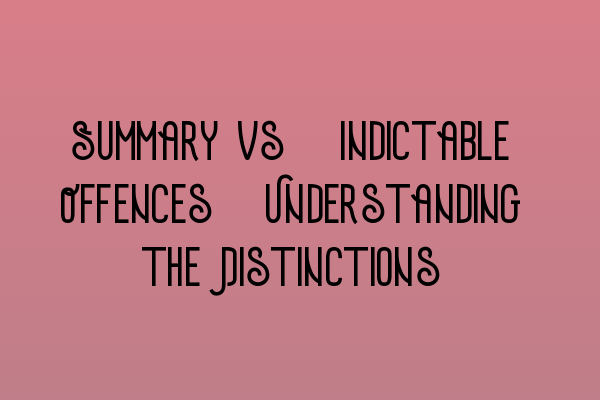Summary vs. Indictable Offences: Understanding the Distinctions
When it comes to criminal law, offences can be categorized as either summary or indictable. Understanding the distinctions between these types of offences is essential for both legal professionals and individuals involved in legal proceedings. In this article, we will delve into the differences between summary and indictable offences, their consequences, and why it is crucial to comprehend their nuances.
Summary Offences
Summary offences, also known as minor offences, are less serious crimes that are typically heard in the magistrates’ court. These offences do not require a jury trial and are usually dealt with swiftly. Some common examples of summary offences include petty theft, public intoxication, and minor traffic violations.
Although summary offences are less severe than indictable offences, they still carry legal consequences. Convictions for summary offences can result in fines, community service, probation, or a short prison sentence. Therefore, it is crucial to seek legal advice and representation if you have been charged with a summary offence.
If you are preparing for the SQE 1 exam, it is important to familiarize yourself with summary offences and their elements. Practice exam questions, such as those available in SQE 1 Practice Exam Questions, can provide you with valuable insights and enable you to assess your knowledge.
Indictable Offences
On the other hand, indictable offences are serious criminal offences that are typically heard in the Crown Court and require a jury trial. These offences have more severe penalties compared to summary offences, including longer prison sentences. Examples of indictable offences include murder, robbery, and drug trafficking.
Due to their gravity, indictable offences necessitate the expertise of legal professionals in building a strong defense strategy. If you are facing charges for an indictable offence, it is crucial to seek the assistance of a criminal lawyer who specializes in such cases. They will guide you through the legal process, gather evidence, and advocate for your rights.
For aspiring solicitors preparing for the SQE 2 exam, it is essential to have a solid understanding of indictable offences and their complexities. SQE 2 preparation courses, such as those offered by SQE 2 Preparation Courses, can equip you with the necessary knowledge and skills to navigate this area of criminal law successfully.
Hybrid Offences
While summary and indictable offences make up the majority of criminal offences, it is important to also mention hybrid offences. These offences, also known as triable-either-way offences, can be prosecuted as either summary or indictable offences, depending on their severity and circumstances. Examples of hybrid offences include assault causing actual bodily harm and theft over a certain value.
The classification of a hybrid offence is determined by factors such as the seriousness of the offense, the potential harm caused, and the defendant’s criminal history. The decision on whether to proceed summarily or by indictment is often made during the early stages of the legal proceedings.
When preparing for the SQE 1 exam, it is essential to familiarize yourself with hybrid offences and understand the factors that influence their classification. Practice mocks, such as those available in SQE 1 Practice Mocks FLK1 FLK2, can help you assess your knowledge and enhance your understanding of the different types of offences.
The Importance of Understanding the Distinctions
Understanding the distinctions between summary and indictable offences is crucial for legal professionals and individuals involved in criminal proceedings. It allows legal professionals to effectively advise their clients and build strong defense strategies based on the specific elements and consequences of each type of offence.
For individuals facing criminal charges, knowing the nature of the offence they are accused of is paramount. It enables them to make informed decisions regarding their legal representation, plea bargains, and the potential outcomes of their cases.
If you are planning to pursue a career in criminal law, it is essential to have a comprehensive understanding of summary and indictable offences. This knowledge will serve as the foundation for your legal practice and enable you to provide expert advice and representation.
Before appearing for the SQE exams, make sure to check the SRA SQE Exam Dates and plan your preparation accordingly.
In conclusion, summary and indictable offences differ in their severity, legal implications, and the courts in which they are heard. Grasping the distinctions between these types of offences is essential for legal professionals and individuals facing criminal charges. By understanding the nuances of summary and indictable offences, legal professionals can deliver effective representation, while individuals can make informed decisions about their legal rights and options.
